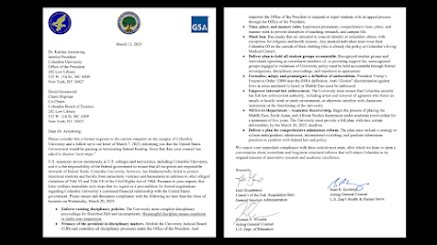Although the item below was put out by a Columbia University group of alumni and others, you can likely take it to be a quasi-official rationale as to why Columbia is doing what it is doing. It is expressed in less diplomatic language than the University would likely utilize. But it's hard to believe that the group would publish it without tacit support of the powers-that-be at Columbia.*
No, the Endowment Cannot Be Used to “Fight Trump” - by Stand Columbia Society
3-29-2025
Let’s put it in perspective: the federal government spends Columbia’s entire endowment of $15 billion every 20 hours. It spends Columbia’s entire annual budget of over $6 billion over the course of a work day. That’s how fast it moves. There is no world where Columbia University can outspend or outmaneuver the federal government.
This narrative is coming from people who, at best, are naively optimistic. At worst, they’re chest-beating chickenhawks eager to volunteer other people’s careers, funding, and futures for their riskless and performative moral grandstanding.
Case in point: The American Prospect recently published a piece titled “Columbia’s Capitulation, and Wesleyan’s Pushback”. The President of Wesleyan University, Dr. Michael Roth, gravely intoned that he understood that Wesleyan was also exposed to the same federal funding threats. “Of course, I think about that. And then I think that’s the classic collaborationist dilemma, right?” Profile in courage? Not quite. Wesleyan gets $9 million a year in federal research grants. Columbia gets $1.3 billion, nearly 150 times more. There are individual faculty members at Columbia whose grant portfolios are larger than all of Wesleyan University.
On July 11, 1804, Princeton alumnus (and seditious traitor) Aaron Burr infamously shot and killed Columbia alumnus Alexander Hamilton. Two hundred and twenty-one years later, the President of Princeton, Dr. Christopher Eisgruber, urged us to “speak up and litigate forcefully”, essentially volunteer to be shot, presumably to protect Princeton. History does not repeat, but it sometimes rhymes.
This post will do what too few have done: think through what would actually happen if Columbia decided to litigate its way out of the government’s threats, and thoroughly debunk this piece of disinformation.
What Is an Endowment?
Let’s start with the basics. An endowment is not a pile of gold coins that sits in some subterranean vault guarded by a three-headed dog or possibly Smaug the Dragon. It’s not a magical reservoir of cash. It is not Scrooge McDuck’s money bin.
Columbia’s endowment is worth approximately $14.8 billion as of June 30, 2024, and is made up of more than 6,450 distinct funds, most of which are restricted for a specific purpose. The most well-known ones are endowed chairs, where the professor’s salary, benefits, and sometimes research are funded by the proceeds of that endowment. An endowed chair in say, physics, usually cannot be “reallocated” to pay for funding shortfalls in mathematics or legal defense funds or PR campaigns.
We say “usually” because there are exceptions. To use an endowment for another purpose requires either the donor’s explicit consent or a court process involving the New York State Attorney General. Restrictions are serious—there have been cases when non-profits have skirted donor intent and have been sued by their donors, sometimes resulting in “clawbacks” of funds. Here’s one involving Princeton.
Approximately $4.8 billion of the $14.8 billion headline number are unrestricted funds, which means they are not dedicated for a specific purpose. But even those are governed by university policies and laws around prudent use of institutional funds and fiduciary responsibilities. The legal bar for using an endowment’s principal—a process known as “decapitalization”—is so high (and also requires donor permission) that we did not do it in the financial crisis of 2008 or even during COVID in 2020.
Two professors recently volunteered themselves and their colleagues for a “10 percent pay cut” to cross-subsidize losses while launching a legal battle against the Trump administration. That’s a meaningless gesture, although we suppose it sounds brave. A professor cannot decapitalize his or her own endowed chair. He or she certainly can’t decapitalize someone else’s, and definitely cannot decapitalize funds for financial aid and other endowed purposes. This is moral signaling with Monopoly money.
Why the Endowment Can’t Be Used to “Fight Trump”
Let’s be generous and assume we even wanted to use Columbia’s endowment as a war chest. What would that look like? Well, we have a few problems.
First, the endowment is not liquid. As of June 30, 2024, about $4.8 billion of Columbia’s endowment is unrestricted. However, that is not liquid. Only 3% are in cash or bonds. The rest are in private equity, global (public) equities, venture capital, hedge funds, and real estate. The global secondary market for stakes in private funds is approximately $87 billion per year, and so liquidating Columbia’s unrestricted portfolio is a material—and potentially market-moving—component of that. That means we will likely take a “haircut” of up to 10% if we were to attempt to turn that volume of assets into cash on short notice—and that is at the end of a sale process that may take months. (10% is generous and assumes high-quality buyout funds; if Columbia is exposed to venture capital or exotic financial instruments, the discount would be even more punitive.) So $4.8 billion in private assets would turn into $4.3 billion in cash.
Second, we have to reserve cash for working capital. Like many universities, Columbia has a mismatched working capital cycle. Specifically, Columbia takes, on average, 55 days to collect cash and 28 days to pay cash. This makes sense (and is common among universities) because government grants, tuition, and insurance reimbursements might take months to materialize, but payroll must happen every few weeks.
What this means is that Columbia must keep approximately one month’s worth of cash on hand to fund this mismatched cycle, which is over $500 million in 2024. $4.3 billion would then become $3.8 billion.
Third, we’d buy less than two years. As we have discussed previously, the federal government gives Columbia nearly $2 billion per year in financial assistance between federal grants ($1.3 billion), Medicare and Medicaid (at least $350 million, likely more), and federal student aid ($318 million). If we torch the entire unrestricted endowment, which dates back nearly three centuries, we would buy less than two years to “fight Trump”.

Fourth, the federal government can continue to inflict damage on us. We have not touched on another important aspect. As we observed last November, the federal government has multiple attack vectors against Columbia. For example, the Trump administration might use student visas. Axios reported earlier this week that the Trump administration might declare entire institutions ineligible for the Student and Exchange Visitor Program, which is the heart of U.S. visa issuance for international students. This is a unilateral executive branch decision. International students pay ~$800 million in tuition per year to Columbia because they are (almost) all full-freight paying students with fairly few eligible for financial aid. If we cannot easily replace 14,000 international students with American students, our cash runway will only fall further. And let’s not forget the lurking specter of an endowment tax.
Fifth, it’s simply not enough. This cash runway is not even enough time to get to the midterms, much less the rest of the Trump administration. So, what exactly is the plan here? Burn the ship to light the sky?
OK, Let’s Fight Trump Anyway. How Would That Work?
Let’s say we do it anyway. Columbia decapitalizes the endowment, burns through cash reserves, and prepares to fight the federal government. What would it take for that strategy to succeed?
Well, you’d have to believe in a sequence of highly optimistic, borderline fantastical outcomes. Here’s what that roadmap looks like:
Legal Victory at Every Level. Columbia would need to challenge federal funding cuts in court—and win at every stage. That means success not just in initial rulings, but also through appeals, all the way to the Supreme Court. No missteps, no setbacks, no unfavorable decisions. And all done quickly, before we run out of cash.
No Retaliation from the Executive Branch. You’d also have to believe that, once litigation begins, the administration wouldn’t respond with further cuts. Right now, $430 million is explicitly at risk. But Columbia receives close to $2 billion annually in federal support—through grants, healthcare reimbursements, and student aid. The full spectrum of federal financial support (worth over $5 billion over multiple years) could be next, as the government has already signalled.
Congress Won’t Step In. Even if Columbia wins in court, you’d have to believe that a GOP-controlled Congress wouldn’t simply rewrite the rules—by removing Columbia from future federal appropriations altogether. If Congress includes an anti-Columbia provision in federal appropriations, it’s virtually impossible to reverse it until Columbia allies are in the majority of both houses of Congress and control the White House.
Our Best Faculty Won’t Leave. Every university will try to poach our best faculty. That’s how rival law firms responded to Paul Weiss. (From the NYT: “We waited for firms to support us in the wake of the president’s executive order,” Paul Weiss’s chairman, Brad Karp, wrote in an email to the firm on Sunday. “Disappointingly, far from support, we learned that certain other firms were seeking to exploit our vulnerabilities by aggressively soliciting our clients and recruiting our attorneys.”) Faculty who want to preserve their research portfolios will take their ideas, staff, students and labs elsewhere. It happened after 1968. It can happen again.
A Decade of Favorable Elections. You’d also need to count on the next two to three election cycles—midterms and presidential contests—to go Columbia’s way. Our cash reserves might give us less than two years of runway. Sustaining this battle would require consistent political wins for a decade or more.
A Surge in Alumni Giving. Finally, you’d need to believe that alumni donations would not only hold steady, but skyrocket to fund the fight. Last year, Columbia raised $653 million in gifts, including one-time mega-gifts. Are we supposed to believe that openly dedicating the university to “fighting Trump” will magically triple those numbers (necessary to backfill the $2 billion hole)—despite the risk of alienating large segments of our base?
If even one of those goes sideways, then it’s game over. Professor Charlie Eaton, an economic sociologist at UC Merced, missed every single one of these points in his chest-beating NYT op-ed “$15 Billion Is Enough to Fight a President.” His principled and courageous willingness to fight to the last Columbia professor and the last dollar of Columbia’s endowment is a sight to behold.
And what exactly are we dying on the hill for? The right of students to take over University buildings? The right to kidnap and injure staff? The right to act as a distribution arm of the “Hamas Media Office”? This is the wrong hill to die on. None of this is broadly supported by the American public, to whom Columbia is not just a beneficiary but a steward of taxpayer money. And they’re not causes that justify permanent institutional damage.
This Is Really, Really, Really Stupid
To recap: this idea isn’t bold. It isn’t radical. It’s not even a protest. It’s financial malpractice. It’s strategic lunacy. And it’s all being driven by people who think they won’t lose their research labs (if they even have them), retirement and tuition benefits, health insurance, housing, or jobs when this fantasy inevitably implodes.
The armchair warriors instructing us to fight Trump? Volunteer your own institutions instead. Don’t demand that Columbia—or its students, faculty, or staff—burn their futures for your moment of performative glory. Our mission is important: if you are not comfortable doing your part to teach the next generation, conduct cutting-edge research, deliver the world’s best clinical care, and be a good neighbor, we would ask you to act according to your convictions and let the rest of our faculty, students and staff move forward. Columbia University is too important to the United States and the world.
In the meantime, the University has work to do. Things like rebuilding public trust, repairing the social contract with the American people, and securing its role as one of this nation’s great research institutions. And that means leaving the cringe-worthy performative heroics to the Internet, where they belong.
Source: https://standcolumbia.org/2025/03/29/issue-037-no-the-endowment-cannot-be-used-to-fight-trump/.
===
*UPDATE: In a private unsigned email to yours truly, Stand Columbia denies coordinating its analysis with Columbia.
































